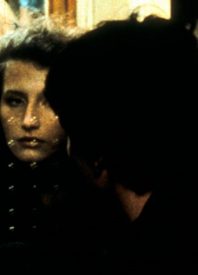
Adapting a Tolstoy novella, Robert Bresson’s L’Argent starts out as a mosaic full of characters before it focuses on Yvon Targe (Christian Patey). Because of mischievous boys producing fake money, he ends up dealing with the French justice system of the 1980s. Even with his minimalist approach, Bresson bestows power within a pat on the wrist. Yvon gets off lightly during a first charge that isn’t even his fault. But the system already condemns him as a guilty person accusing others of being the lying cheats that they think he is. Bresson beautifully works with contrasts. He also proves how effective his approach is.
Bresson doesn’t feel the need to spoon feed his audience by connecting all the dots. We’ll instead extrapolate and understand more than what he intentionally puts on screen. The mere act of staging his dramas from the confines of studios and into the real world is enough. He follows this external release, this trajectory of most cinema while staying true to himself. The 1.66:1 ratio feels as constricting as his signature deadpan dialogue. But it’s enough to show the inescapable infrastructure that catches up on Yvon as he commits one crime after another. Bresson doesn’t give us the satisfaction of a chase scene even if he’s technically creating a crime drama.
Bresson’s sparse imagery also highlights how devastating Yvon’s life eventually becomes. Scenes take place in prison, where Yvon’s knowledge of the outside world only comes through letters from his wife Elise (Caroline Lang). She informs him of their child’s death and of her decision to leave him. A lesser director would have told their actors to stretch out their hands, to tense up a few arm muscles, or to show more physical indications of pain. And sure, there’s the occasional Greek chorus, the other prisoners speaking for Yvon. But Bresson chooses restraint reminiscent of still life paintings and L’Argent is more effective for it. Some prison scenes don’t have to show Yvon’s face for us to understand his agony.
L’Argent, like most of Bresson’s films, or films in general, require suspension of disbelief. He shows us the cleanest prison ever, where prisoners have the most pure pin-up models ever. This checks out, perhaps, with an assumption that he’s obviously taking from his real life experiences. As fresh as his perspective is on 1980s Paris, he’s as stubborn as other directors who wishes the world of his youth to stay that way. This cleanliness ironically contrasts the outside world that, although as just as clean, is full of oppression and temptation. This is where he takes us to several left turns. And even with his long career, Bresson stayed relevant. He makes solitude and its empty spaces keep our interest in what makes other human being tick.
Watch L’Argent on the Criterion Collection.

